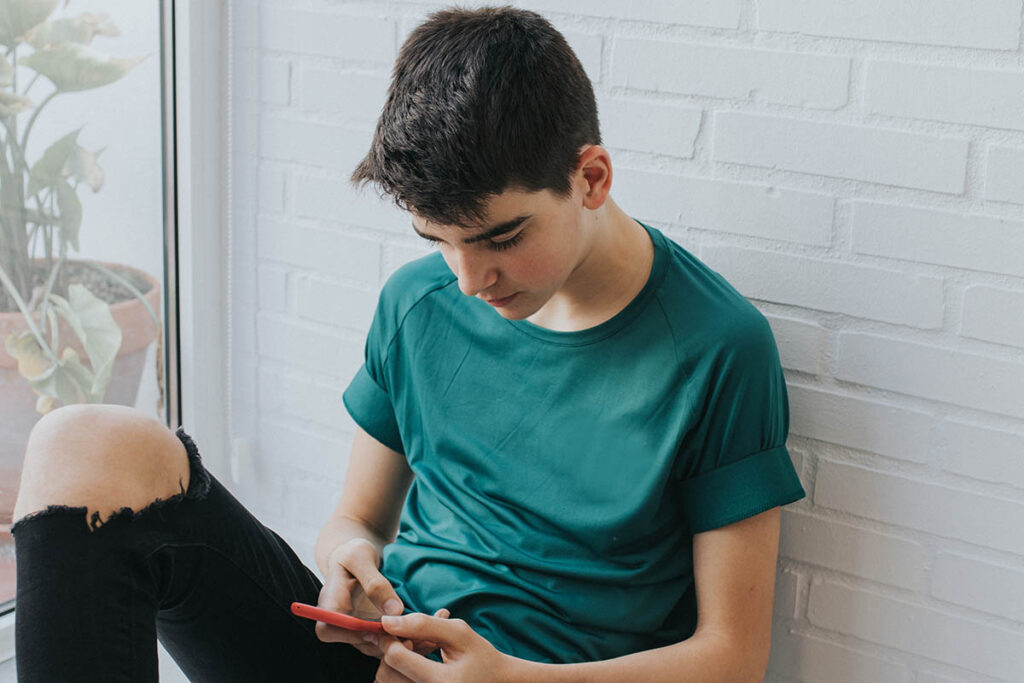How social media affects mental health has become the subject of much debate. As it continues to play a central role in teens’ lives, it seems to have an influence on body perception. In fact, research shows that there’s a connection between social media and body image. It may even explain why more teens need mental health treatment. The combination of the two can lead to social media addiction or disordered eating treatment. While there are positive and negative effects of social media on body image, it is critical to address these effects. Doing so can significantly impact the life of the teen. To learn more about the positive and negative effects of social media on body image, or to enroll your teen in our social media addiction or disordered eating treatment program, please contact Foothills at Red Oak Recovery today at 866.300.5275.
Social Media Use Statistics
According to a 2015 Common Sense Media study, 70% of teens use social media more than once per day. Most of them reported enjoying social media too. However, many of them admitted to only sharing pictures and information that make them look better than they perceive themselves. In general, they only post what they believe makes them look ideal.
The Relationship Between Social Media and Body Image
With this frame of mind, it’s no wonder why there’s an association between body perception and social media. A 2011 study found that girls who spend a lot of time on social media have body image problems. Another 2014 university study found a link between teens who use Facebook and disordered eating. In fact, one treatment center found that 30% to 50% of its eating disorder patients used social media.
In addition, a 2017 study connects social media and body image. Among more than 100 female undergraduates, the study found that interacting with peers changed their body perceptions. After interacting with family members, though, their perceptions didn’t change. These findings suggest that engaging with attractive peers on social media negatively affects body image.
Despite this, Mental Health America notes that social media doesn’t directly cause body perception issues. Instead, it acts as a trigger for those with a predisposition to mental health conditions. The reason is that using social media increases exposure to body shaming and competition with peers. These elements can make mental health tendencies worse, such as disordered eating.
What Is Disordered Eating?
Disordered eating isn’t the same as an eating disorder, despite the similarity between the two names. Eating disorders are mental health conditions that require treatment. Disordered eating is a general term used to describe unhealthy eating habits. It’s characterized by patterns of chaotic and restrictive eating. For example, someone with disordered eating might diet frequently or eat very large or small amounts of food in one sitting. Disordered eating can also include other behaviors, such as:
- Social isolation
- Compulsive exercise
- Skipping meals
- Eating in secret
- Obsessing over food and weight
- Using laxatives or diet pills
While social media doesn’t cause disordered eating, it is a risk factor. That’s because social media can lead to feelings of inadequacy and low self-esteem. For example, looking at posts of people with perfect bodies can cause someone to feel bad about their own appearance. This, in turn, can lead to unhealthy eating habits as a way to cope with these feelings.
The Risk of Other Mental Health Issues
However, the relationship between social media and body image isn’t the only risk. Teens are also at risk of developing an addiction to social media and technology. In fact, a 2014 study found that excessive technology use causes mental and physical health problems in teens. It can disrupt their focus in school and sleep patterns too.
Although social media addiction doesn’t sound like a real thing, it’s comparable to other addictions. The disorder develops when neurons in the brain stimulate the release of dopamine. This stimulation can occur after doing anything that gives teens the feeling of pleasure, including viewing social media.
When the brain adapts to high levels of dopamine, it can’t function normally when those levels drop. At this point, teens need an adolescent treatment center NC offers to help them manage the problem.
Get Help for Social Media Overuse and Body Image Issues
Does your teen use social media too much? Has he developed signs of mental or behavioral issues? Foothills at Red Oak Recovery is a substance use, mental health, and disordered eating treatment center. We offer a range of programs, including:
- Outpatient treatment
- Trauma treatment
- Gaming addiction treatment
- Smartphone addiction treatment
- Substance abuse treatment
- Process addiction treatment
Don’t ignore the risk of your teen developing mental health issues because of social media. Get excessive technology use under control through professional treatment. Contact 866.300.5275 to learn more about social media and body image or to enroll in our disordered eating or social media addiction treatment program.

